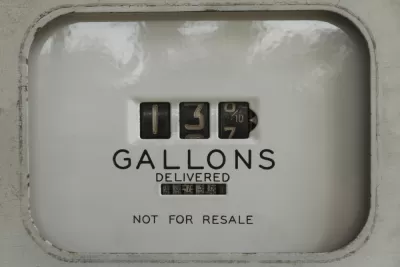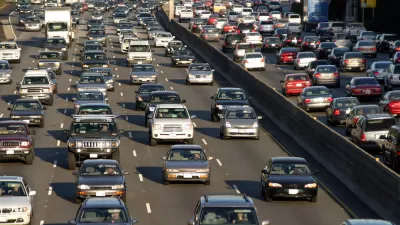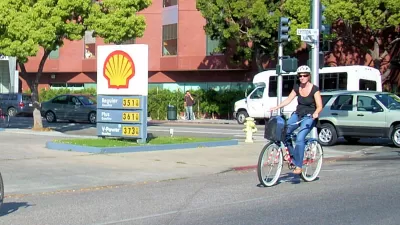In a turnaround from prior voter surveys, a poll released Wednesday on November propositions found a slim majority of voters opposed to repealing the state's first legislative gas tax increase since 1989. Rent control opponents received good news too

"Two of the most contentious measures on the November ballot — repealing California’s gas tax and empowering cities to expand rent control — are struggling to gain traction with voters six weeks before the election, according to a new poll," reports Marisa Kendall for the Bay Area News Group.
About half of likely voters say they would reject both measures, while a little more than a third would support them, according to a statewide poll released Wednesday night by the Public Policy Institute of California.
Voters were more likely to reject Proposition 6, which if passed would repeal the 2017 gas tax and vehicle registration fee increase intended to raise $5.1 billion annually by 2020, with the money going to fix the state’s freeways and streets and refurbish trains and buses. Fifty-two percent of likely voters said they would vote no, 39 percent said they would vote yes, and 8 percent said they didn’t know. Democrats were even more likely to reject the gas tax repeal, while Republicans were inclined to vote for it.
The survey results are a stark turnaround from the last three statewide polls posted here:
- USC Dornsife/Los Angeles Times poll, May 2018: Repeal was favored by 51% of voters while 38% supported keeping the higher taxes; 9% hadn't heard enough to say either way and 2% said they wouldn't vote on the measure.
- UC Berkeley’s Institute for Governmental Studies poll, December 2017: Repeal favored by 52% with 43% supporting retention of the taxes and fees.
- USC Dornsife/Los Angeles Times poll, November 2017: 54% would repeal; 46% would retain.
"But nearly everyone agreed the gas tax will be a crucial issue on the November ballot — 84 percent of likely voters described the issue as very important or somewhat important," adds Kendall on Wednesday's poll.
State gas tax history
The last actual gas tax increase (as opposed to an annual adjustment determined by the state Board of Equalization) was by one cent in 1994, resulting from a nine cents per gallon tax increase included in Proposition 111 that 52 percent of voters supported in June 1990. A year earlier, the legislature had agreed to place the measure on the ballot by approving Senate Constitutional Amendment 1.
If Proposition 6 is passed, the 12 cents-per-gallon gas tax increase that went into effect last November will be repealed, and all future gas tax increases would have to be decided by the voters, similar to Prop. 111.
Rent control initiative
Forty-eight percent of likely voters said they would reject Proposition 10 — a measure that would give cities unlimited authority to impose rent control by repealing Costa Hawkins, the state law that prohibits capping rents on single-family homes or buildings built after 1995 and allows landlords to charge new tenants market-rate rents when long-term renters leave," reports Thirty-six percent said they would vote for the measure, and 16 percent said they didn’t know.
Recent posts on the rent control initiative:
-
California REITS Have Much at Stake on Election Day, August 15, 2018
Addressing both ballot initiatives, Mark Baldassare, president and CEO of PPIC, and a former professor of urban and regional planning at the University of California, Irvine, observed:
“What the polls suggest is that the proponents would have a lot of work to do to get to the majority support because right now they’re not close to it.”
All 11 California propositions can be found on Ballotpedia.
Kendall also reports on the poll results on political races in the general election, including governor: Newsom (D) vs. Cox (R), and U.S. Senator: Feinstein (D) vs. de León (D).
Survey details
"Findings in this report are based on a survey of 1,710 California adult residents, including 1,195 interviewed on cell phones and 515 interviewed on landline telephones," according to the PPIC press release. "Interviews took place from September 9–18, 2018."
FULL STORY: California ballot: Rent control loses, gas tax stays in new pre-election poll

Planetizen Federal Action Tracker
A weekly monitor of how Trump’s orders and actions are impacting planners and planning in America.

Maui's Vacation Rental Debate Turns Ugly
Verbal attacks, misinformation campaigns and fistfights plague a high-stakes debate to convert thousands of vacation rentals into long-term housing.

Restaurant Patios Were a Pandemic Win — Why Were They so Hard to Keep?
Social distancing requirements and changes in travel patterns prompted cities to pilot new uses for street and sidewalk space. Then it got complicated.

In California Battle of Housing vs. Environment, Housing Just Won
A new state law significantly limits the power of CEQA, an environmental review law that served as a powerful tool for blocking new development.

Boulder Eliminates Parking Minimums Citywide
Officials estimate the cost of building a single underground parking space at up to $100,000.

Orange County, Florida Adopts Largest US “Sprawl Repair” Code
The ‘Orange Code’ seeks to rectify decades of sprawl-inducing, car-oriented development.
Urban Design for Planners 1: Software Tools
This six-course series explores essential urban design concepts using open source software and equips planners with the tools they need to participate fully in the urban design process.
Planning for Universal Design
Learn the tools for implementing Universal Design in planning regulations.
Heyer Gruel & Associates PA
JM Goldson LLC
Custer County Colorado
City of Camden Redevelopment Agency
City of Astoria
Transportation Research & Education Center (TREC) at Portland State University
Jefferson Parish Government
Camden Redevelopment Agency
City of Claremont




























